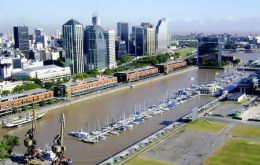MercoPress. South Atlantic News Agency
Stories for August 2011
-
Thursday, August 18th 2011 - 03:00 UTC
CFK message to business leaders: cut imports, boost supply, State assures demand

Argentine President Cristina Fernández de Kirchner, CFK, demanded a “cultural change” from business and corporate leaders so as to bring down imports and increase the supply of goods and services, as well as doubling investments, while the State ‘stimulates demand’.
-
Thursday, August 18th 2011 - 02:54 UTC
Brazilian Agriculture minister steps down following corruption allegations

Brazilian Agriculture minister Wagener Rossi resigned to his post Wednesday following revelations of irregularities in his office thus becoming the fourth minister to step down, in eight months, of President Dilma Rousseff administration.
-
Wednesday, August 17th 2011 - 23:42 UTC
La Niña threatens Brazil and Argentina crops says Oil World

South American grain and oilseed production may be in jeopardy from the formation of a La Niña weather pattern, which might curb rainfall in parts of Brazil and Argentina, Oil World said.
-
Wednesday, August 17th 2011 - 23:36 UTC
IMF chief Lagarde on trial for complicity of embezzlement in France

French magistrates formally opened an investigation into IMF chief Christine Lagarde this week for possible misconduct in approving a huge payment to a friend of President Nicolas Sarkozy when she was Finance minister.
-
Wednesday, August 17th 2011 - 23:15 UTC
Venezuela: biggest oil reserves, but also record corruption and mismanagement

Venezuela received an enviable honour last month: OPEC said it is sitting on the biggest reserves of crude oil in the world – even more than Saudi Arabia. But the Venezuelan oil industry is also sitting atop a well of trouble.
-
Wednesday, August 17th 2011 - 23:06 UTC
Record prices for Uruguayan beef but insufficient cattle in 2011/2012

Uruguay’s beef industry is short of cattle and the annual slaughter for 2011 is expected to be the lowest in a decade, similar to ten years ago when the foot and mouth disease crisis that isolated the country from world markets.
-
Wednesday, August 17th 2011 - 14:40 UTC
Brazil JBS, world’s largest beef producer, reports losses and mounting debt

Brazil's JBS SA, the world's biggest beef producer, reported a second-quarter net loss of 180.8 million Real (114 million dollars), reversing a year-ago gain as US performance suffered.
-
Wednesday, August 17th 2011 - 08:16 UTC
Sarkozy and Merkel pledge support for the Euro but disappoint markets

The leaders of France and Germany meeting in Paris unveiled wide-reaching plans for closer Euro zone integration, including deficit limits and biannual summits but said joint Euro bonds could only be a long-term option.
-
Wednesday, August 17th 2011 - 07:45 UTC
Brazil’s ruling coalition looses one member following corruption allegations

One of the smallest parties from the Brazilian ruling coalition has stepped down with “no hard feelings” and will now adopt a ‘critical support’ attitude towards the administration of President Dilma Rousseff.
-
Wednesday, August 17th 2011 - 07:36 UTC
Sao Paulo, Rio, Caracas and Bogotá most expensive cities in South America

The Brazilian cities of Sao Paulo (19) and Rio do Janeiro (26), together with the Venezuelan capital Caracas (47) and Bogotá (57) Colombia, figure among the most expensive cities in Latin America, according to a bi-annual rating from the Swiss bank, UBS.
